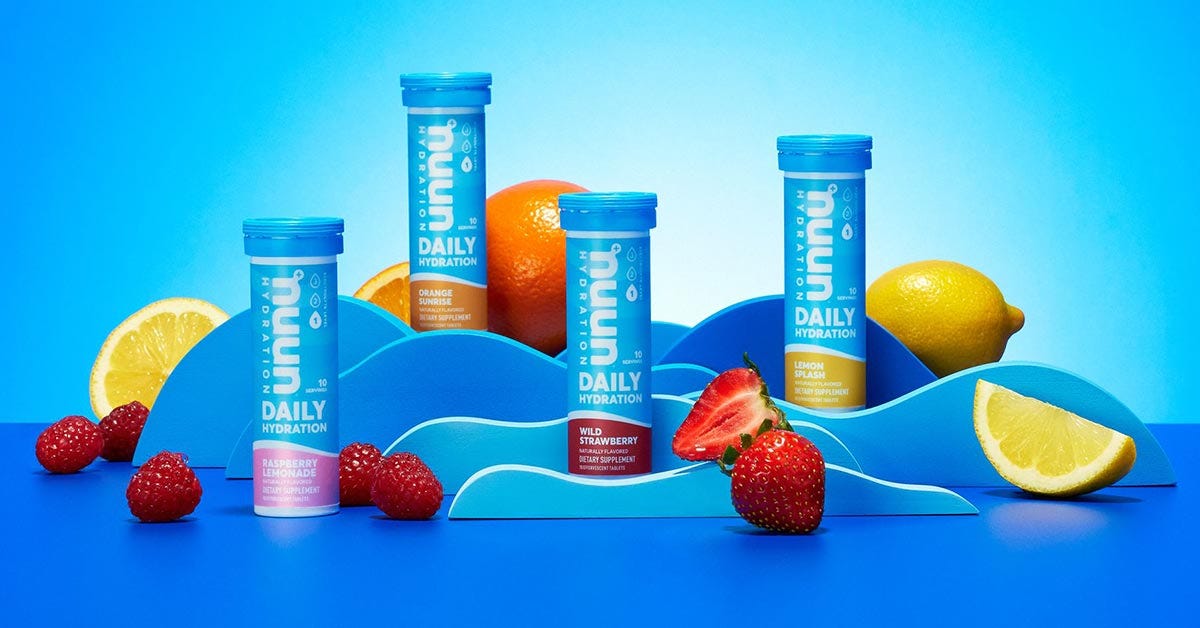Anyone in the long-distance running world has undoubtably heard of NUUN tablets. They are an easy to carry tablet that can be dropped in a water bottle, instantly dissolving in a light fizz to create a quick and easy source of electrolytes. For runners, this product is essential as its easy to carry and provides the hydration necessary to keep on pace. NUUN’s newest product line, “Daily Hydration” is going beyond the running world to provide hydration for those that just want to support daily hydration and functioning. NUUN’s Daily Hydration tablets come in Orange Sunrise, Lemon Splash, Wild Strawberry, and Raspberry Lemonade. Their claims are in no sugar, hydrating electrolytes, and clean ingredients. Let’s look at the ingredient statement to see if the claims are substantial. For purposes of simplicity, we will be looking at the Raspberry Lemonade.
Citric Acid—Commonly found in citrus fruits, with the highest amount of citric acid found in lemons. The body also produces citric acid as part of the process to convert food to energy. Commercially, citric acid is produced by fermenting sugar with a black mold. Citric acid adds a sour taste to a food or beverage and, in this product, it is bringing out the flavor of the lemon.
Sorbitol—This is a sugar alcohol that occurs naturally in small amounts in apples, pears, peaches, and prunes and is about 60% as sweet as sugar. It is typically manufactured from corn syrup and, like other sugar alcohols, might produce gastrointestinal issues when consumed, especially laxative effects. For athletes it is beneficial as it is digested slowly allowing for a longer carbohydrate (energy) release.
Dextrose—This is a simple sugar typically made from corn. Since it is a simple sugar, the body uses it as a quick source of energy that raises blood sugar quickly. For athletes, dextrose is important to provide quick energy. But for non-athletes, it gets processed into fat (unless the body needs the quick energy)
Natural flavors with other natural flavors— This would be natural flavors from raspberries and lemons as well as other flavors that occur throughout nature (NUUN or its flavor supplier do not need to disclose where these “other natural flavors” come from).
Malic acid—Malic acid is found naturally in apples, as well as other fruits. Commercially, malic acid is made from bacterial fermentation then chemically altered. In this product, the malic acid is bringing out the raspberry flavor (raspberry fruit has a high amount of naturally occurring malic acid).
Stevia Leaf Extract—This is a plant based sweetner that is 200-400 times sweeter than sugar. The leaf of the stevia plant has the most sweetness components. The sweetness components are extracted and concentrated, often standardizing for one sweetness component (Rebaudioside A). Stevia can leave a bitter or metallic taste in the mouth if used too high
Safflower Oil—Safflower is a plant which its seeds are used to produce safflower oil. Safflower oil is high in poly unsaturated fats (particularly omega-6 fatty acids). Poly unsaturated fats can be used by the body for various functions and are considered a good type of fat. In this product, safflower oil is used to give the product a non-chalky, smooth mouthfeel.
Beet Powder Color—Beets are notorious for dying things pink/red when improperly handled. The red color of the beet is extracted and used to make food and beverages products look pink/red. Since this is a raspberry lemonade product, the beet root is making the beverage look pink (for raspberry).
Final Evaluation
Ingredient Quality: C. This product is natural but has no other claims to it. Including sorbitol and dextrose as the second and third ingredient (respectively) is not a clean label statement, despite the claims.
Ingredient Clarity: C. It doesn’t make sense that sorbitol and dextrose are included in a product that markets itself to the non-athletic consumer. Both ingredients are helpful for sustaining energy for athletes but would not benefit the everyday consumer.
Functional Benefit: B-. There are multiple electrolytes (magnesium, calcium, sodium, potassium) at levels that would give this product a good functional benefit. However, magnesium carbonate and calcium carbonate are not the most bioavailable electrolyte sources. There are much better electrolyte sources of magnesium and calcium than what is in this product.
Nutritional Value: A. At 15 calories, this is a low-calorie way to obtain a hydrating amount of electrolytes
Overall Score: C+. Two of the electrolyte sources have low bioavailability, which means that consuming them would not actually give the needed benefits. Addition of non-clean label ingredients like sorbitol and dextrose do not make sense to a product that is marketed towards the active (but not athletic) consumer. The delivery form (a tablet) is unique, and unlike anything else seen on the market. However, if you are looking for clean hydration this product is not it—there are much cleaner and simpler hydration products on the market that would support your goals.
Would you buy this product? Why? Let us know below!
This product was evaluated purely based upon the perspective of a food scientist. The writer’s opinions are purely her own without influence or affiliation with the brand.



